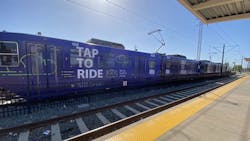SacRT offers riders ability to tap to pay onboard all light-rail trains
SacRT riders can now tap their contactless credit, debit, prepaid card or payment-enabled device (mobile phone, smartwatch or other) on readers installed onboard all SacRT light-rail trains for an easy and secure way to ride transit.
The new contactless payment option is a collaboration between SacRT, Visa, Caltrans, Cybersource, Littlepay and SC Soft. This effort is part of a statewide initiative to improve and simplify the transit experience through the California Integrated Travel Project (Cal-ITP).
To celebrate the new contactless fare options, SacRT is offering $1 fare for single rides on light rail during the month of September 2021. Contactless payment readers have been installed at the front/back of each SacRT light-rail train. The demonstration began in June 2021 on the Green Line and quickly expanded to all light-rail trains on all lines.
“We are always looking for ways to use innovative technology to make using transit easier and more convenient for the community,” said SacRT General Manager/CEO Henry Li. “These devices allow someone to use the same form of payment for their light rail ride and their coffee, simply tap and ride.”
When tapping to pay, a light rail rider’s daily fare charges will be capped at $7—the same value as a Connect Card Daily Pass—no matter how many times they ride light rail, enabling customers to pay as they go until they hit this daily maximum when using the same contactless bank card or mobile wallet throughout the day.
“Much of our goal is a more modern and consistent transportation experience throughout California,” said Caltrans Director Toks Omishakin. “Allowing riders to pay for transit with the same method they use elsewhere not only increases efficiency and mobility, but also reduces barriers to using public transportation.”
Cybersource, a Visa solution; Littlepay, a transit-focused payments platform; and SC Soft, a transit ticketing and automated fare collection specialist, have been critical in bringing the demonstration project to life.



